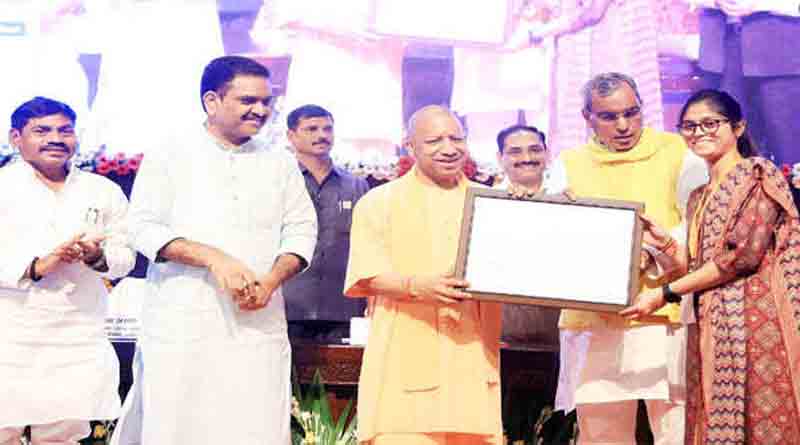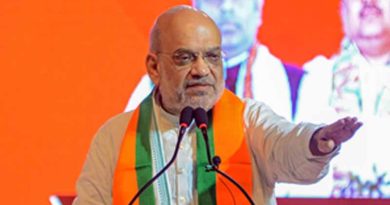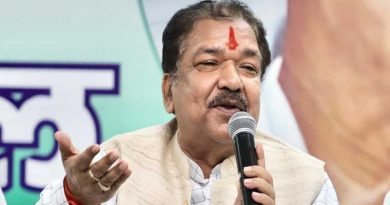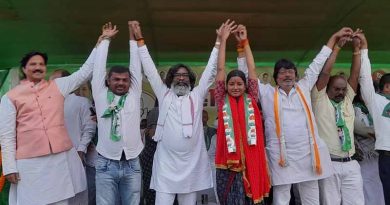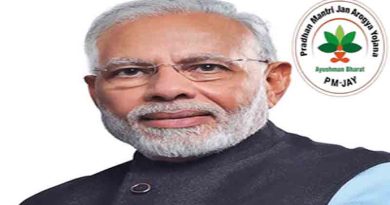Yogi distributes appointment letters to 1,950 youths selected by UP S S S C
Insight Online News
Lucknow, Oct 24 : Chief Minister Yogi Adityanath on Thursday provided appointment letters to 1,950 youths, selected by the UP Subordinate Services Selection Commission.(SSSC)
It included 1,526 Gram Panchayat Officers, 360 Gram Vikas Officers (Social Welfare), 64 Social Welfare Supervisors .
Yogi expressed optimism that if appointments are made with consistent fairness and transparency during the entire tenure, “UP will emerge as India’s leading economy, and India will achieve development and self-reliance by 2047,” he said.
He reflected on the challenges faced by job seekers in Uttar Pradesh before 2017 and said that despite their competence and qualifications, many deserving candidates were left out of the selection process during previous administrations.
After presenting appointment letters to the newly recruited youth, the CM said, “Jobs were granted based on influence and money, and not merit. Many capable candidates were unable to secure positions because their families didn’t have the financial resources or connections.”
He said, “In the last seven-seven and a half years, there was no discrimination against anyone in the selection process. Since our government took office, recruitment for government, private sector and contractual jobs have been conducted with complete transparency and integrity, which have contributed to Uttar Pradesh’s rapid growth in various sectors.”
He said that in the past seven and a half years, his government has successfully completed nearly 7 lakh recruitment in government services. He attributed this success to creating a secure environment in the state, which has also opened up job opportunities for thousands of young people in the private sector.
The CM said, “Earlier, many young people from UP had to search for jobs across the country and even abroad. Today, they are finding jobs in their own state, region, and even district, allowing them to balance work, family, and household responsibilities.”
He also mentioned that most Gram Panchayati Raj officers and candidates selected for roles in the Panchayati Raj Department received appointments in the districts where they live.
Yogi emphasised that his government has worked on a comprehensive development plan for the state, in which transparency in the recruitment process played a key role. “If good and capable candidates are not selected, the system responsible for implementing government schemes would become ineffective. To prevent this, our government decided in 2017 that all recruitment commissions and boards must follow a fair and transparent process, adhering to reservation rules.”
He highlighted the pivotal role of Gram Panchayats in realising the vision of Gram Swaraj (village self-governance) laid out by Mahatma Gandhi. Speaking on the future goals of the nation, he referred to PM Narendra Modi’s vision for a self-reliant and developed India by 2047, the centenary of independence.
The CM said, “The foundation for a self-reliant India starts at the grassroots and our Gram Panchayats are the building blocks of this vision.”
He praised the efforts of the Panchayati Raj Department, which, following the 73rd Constitutional Amendment, has empowered Gram Panchayats to undertake 29 different types of development activities.
Yogi said that in the past, Gram Panchayats lacked their own infrastructure and many village heads (Gram Pradhans) worked from home, often delaying or missing out on creating and implementing action plans. “This led to underutilisation of funds,” he said.
However, he pointed out the significant progress made in recent years with over 57,000 Gram Panchayats in UP now equipped with Gram Sachivalayas (village secretariats), complete with facilities like optical fiber, internet, and Wi-Fi. “A computer operator, designated as Gram Panchayat Sahayak, has also been appointed to help address village-related issues directly within the village itself,” he said.
The CM said, “Essential services like income, caste, and residence certificates should now be available online in the village.”
He urged to prepare a year-long action plan in collaboration with village heads and residents.
He emphasised that development should not rely solely on central and state funds, but also explore ways to generate local resources, moving towards self-reliance at the village level.
Yogi emphasised that every Gram Panchayat in UP has the potential to become self-reliant.
Speaking on the need for innovative development in villages, Yogi encouraged local bodies to make use of available resources. “Every Gram Panchayat likely has some surplus land, and there are village markets that can be developed into rural hubs,” he said.
He also stressed the importance of ensuring that village drainage systems do not pollute nearby rivers or ponds, suggesting indigenous treatment methods to keep water bodies clean. He pointed out that ponds could be utilised for fish farming and other activities, which would generate additional income for the Gram Panchayats.
The CM directed the Panchayati Raj Department to prepare a proposal to optimise the use of funds. He suggested that while a portion of central and state funds is spent on salaries and allowances, Gram Panchayats should focus on generating their own revenue. “In the first phase, the state government would match the amount the Panchayats collect from their local resources to further boost development,” he said.
He also discussed the concept of ‘smart villages’ and said that 17 cities in the state are already on the path to becoming smart. “Why can’t Gram Panchayats also become smart?” he said, proposing several measures for modernisation.
Yogi encouraged setting up cleanliness and waste management systems with public participation and working with the power corporation to install street lights and CCTV cameras in key areas for both security and convenience. He suggested using sensors or appointing Gram Panchayat employees to ensure the lights operate on time.
Besides, he recommended the installation of public address systems in villages to enhance communication. He expressed his hope that Gram Panchayats in UP would take the lead in national competitions, earning recognition and awards for their initiatives.
The CM emphasised the need for Gram Panchayats to revive traditional methods for waste management by reintroducing compost pits, which were once a common practice in villages.
Speaking on the importance of utilising local resources, he encouraged the construction of compost pits on reserve land, grazing areas, and cow shelters, which could also be used to care for stray cattle.
Besides, he urged village leaders to identify residents, who have not yet benefited from government schemes and ensure that every poor individual receives support, as this would build trust between the people and the administration.
The CM said, “When the poor are supported, they give blessings, but when neglected, they curse,” he said.
He proposed creating additional income opportunities near the village secretariat by constructing community centres, where public events could be held. He suggested charging villagers a user fee for these facilities, which would contribute to the Panchayat’s income.
Yogi said that fair price shops are being developed as models near village secretariats, where not only government ration, but also other goods can be distributed. “The rent from these shops will be deposited in the Gram Panchayat’s account, creating another revenue stream for local development,” he said.
He stressed the importance of initiative and effort in driving these changes, stating that government funds must be used wisely. “If the funds are used effectively, the Gram Panchayat will become self-reliant, developed, and an ideal model for others to follow. Such efforts would give village leaders a new identity and recognition,” he said.
He emphasised the crucial role played by the Social Welfare Department in uplifting marginalised communities through various welfare schemes. He said that the department is providing scholarships to over 21 lakh students and is actively involved in programmes like mass marriages and pensions, which are giving new opportunities to Scheduled Castes and Tribes.
He stressed the importance of ensuring the continued growth of these initiatives, which provide much-needed support to underprivileged youth.
The CM highlighted a significant achievement by pointing out that a young tribal (Tharu) candidate from Lakhimpur Kheri had also received an appointment letter, marking a step forward in tribal empowerment.
He said that the presence of a large number of women receiving appointment letters is an encouraging sign of progress towards women’s empowerment in the state.

